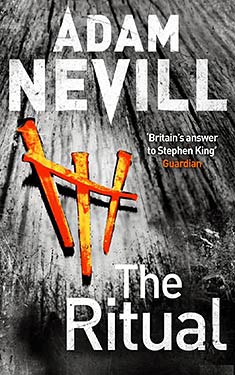WoGF Review: The Summoning by Kelley Armstrong
 Barbara Evers (Bevers) is an active member of SCWW and has two novels in progress. Her short stories have appeared in The Petigru Review and Stupefying Stories. Her essay, Unexpected, appeared in the award winning anthology, Child of My Child. In the real world, Barbara is a corporate trainer, instructional designer and occasional public speaker. In her spare time (!?), she reads slush for Stupefying Stories. Her writing blog, An Eclectic Muse, abides by its name, so don’t be surprised at the variety of topics you find there.
Barbara Evers (Bevers) is an active member of SCWW and has two novels in progress. Her short stories have appeared in The Petigru Review and Stupefying Stories. Her essay, Unexpected, appeared in the award winning anthology, Child of My Child. In the real world, Barbara is a corporate trainer, instructional designer and occasional public speaker. In her spare time (!?), she reads slush for Stupefying Stories. Her writing blog, An Eclectic Muse, abides by its name, so don’t be surprised at the variety of topics you find there.
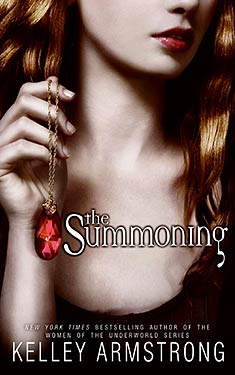 I receive email alerts from BookBub every day concerning free downloads on Kindle. The Summoning was not in the list, but while I considered one fantasy, I noticed a review suggesting to not waste my time on the suggested book. The reviewer said I should read Kelley Armstrong‘s The Summoning instead. Curious, I found the book and downloaded it.
I receive email alerts from BookBub every day concerning free downloads on Kindle. The Summoning was not in the list, but while I considered one fantasy, I noticed a review suggesting to not waste my time on the suggested book. The reviewer said I should read Kelley Armstrong‘s The Summoning instead. Curious, I found the book and downloaded it.
YA is not my preferred fantasy genre, and when I do read it, it tends to be along the lines of Harry Potter or Eragon, so Armstrong’s book was a change for me. That said, the book is well-written, and I read it quickly.
Fifteen-year-old Chloe lives as normal a life that she can, considering her mother died when she was a young child and her father travels, leaving her with housekeepers. Behind in development, Chloe explodes into development in one huge blast. By the end of one day, she’s begun her period, been asked (sort of) to a dance, and started seeing dead people. Yes. In Sixth Sense style, she sees dead people, but she doesn’t understand what’s going on. After all, it just started.
When the burned ghost of a dead janitor frightens her into running through the school halls screaming, she’s sent to a home for children with special needs with a promise from her beloved Aunt Lauren that it will only be for two weeks. At Lyle House, the doctors tell her she suffers from schizophrenia. Unsure of what to think, she begins to study the actions of the other teens in this home.
And discovers Lyle House is not all it seems. Chloe is not alone in her talents. Others at the home have unusual abilities. Soon she learns that a population of supernatural beings exists, and two of the boys at the home have a connection to them. They hatch a plan to escape, and that’s when they discover how many people truly know what they are and seek to control them.
 The Summoning is well-written with good character development and suspense. Not a lot came as a surprise to me, but I’m not the typical reading audience, either. The one point that caught me off-guard half-way through the book was that Simon was Asian. I missed that during our first introduction to him. The rest of the character descriptions, especially, Derik’s, are vivid and full of life.
The Summoning is well-written with good character development and suspense. Not a lot came as a surprise to me, but I’m not the typical reading audience, either. The one point that caught me off-guard half-way through the book was that Simon was Asian. I missed that during our first introduction to him. The rest of the character descriptions, especially, Derik’s, are vivid and full of life.
Since Chloe attended a school for the arts in hopes of becoming a movie director someday, there are a lot of movie references and film development details that I truly enjoyed. I found myself impressed with Armstrong’s ability to work those details in so well. In fact, I wondered if she might have a film background.
If you enjoy YA fantasy with supernatural beings like you see in the TV show Alphas, then this could be a book you will want to read. It is first in a series.
4 Stars out of 5.
WoGF Review: Soulless by Gail Carriger
 Christine Bellerive (cmbellerive) is an omnivorous reader who devours literary and genre fiction alike. When she’s not reading, she’s editing other people’s books — and writing a fantasy novel of her own. Her other interests include stringed instruments and hunting dogs of the American South. She blogs at Strange Quarks.
Christine Bellerive (cmbellerive) is an omnivorous reader who devours literary and genre fiction alike. When she’s not reading, she’s editing other people’s books — and writing a fantasy novel of her own. Her other interests include stringed instruments and hunting dogs of the American South. She blogs at Strange Quarks.
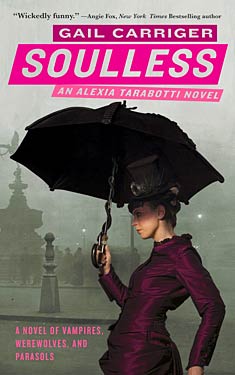 I picked Soulless because of the fun cover: Victorian girl with attitude, holding unspeakably awesome brass parasol. I figured it’d be a whimsical light read.
I picked Soulless because of the fun cover: Victorian girl with attitude, holding unspeakably awesome brass parasol. I figured it’d be a whimsical light read.
The story takes place in an alternate history where “supernaturals” (vampires, werewolves, ghosts) are accepted in society and live their lives duly regulated by law. Queen Victoria has a government bureau to oversee them. Alexia Tarabotti is a snarky spinster who belongs to another class of beings: “preternaturals,” which means humans who have either too much soul or no soul at all. She’s one of the soulless ones, which basically seems to mean that she has terrible taste in art, and also she can neutralize a supernatural. Werewolves and vampires lose their powers when in physical contact with her.
Enter Lord Maccon, a handsome and wealthy werewolf. Romance and hijinks ensue.
Unfortunately I didn’t enjoy this book as much as I thought I would. For one thing, it’s on the girly side for my taste. I was hoping for an adventure story, but this is really a romantic comedy, and romantic comedy of the type that reads like the naughty dreams of a fifteen-year-old girl. Maybe if I liked that sort of thing in general, I’d be more positive about this book, but it just wasn’t for me on the basis of genre alone. I can hardly read Jane Austen, even though I recognize the quality of her writing, because of the ladies-in-drawing-rooms-worrying-about-love subject matter. So reading a knockoff wasn’t much fun.
I also found it difficult to get past the stilted pseudo-Victorian diction. I don’t mind a mannered and archaic voice — I really enjoyed E. B. Hudspeth’s The Resurrectionist – but for me the execution has to be spot-on. Carriger uses some genuine Victorianisms, but also a lot of stereotypical British phrases that sound cut-and-pasted from Mary Poppins, as well as modern expressions that are anachronistic in context. She sticks them together in long, poorly-constructed, vaguely Austen-ish sentences and calls it steampunk. It was like listening to someone talk in a terrible fake accent for 350 pages.
 The concept of “soulless” people was pretty original, and I liked the eventual introduction of scientists trying to figure out what vampirism is. What is the “soul,” and how does it transfer from person to person? There are some potentially interesting themes here, but nothing much gets done with them. Alexia is occasionally witty, and there were even a couple moments when I chuckled out loud. Still, overall I didn’t enjoy this book.
The concept of “soulless” people was pretty original, and I liked the eventual introduction of scientists trying to figure out what vampirism is. What is the “soul,” and how does it transfer from person to person? There are some potentially interesting themes here, but nothing much gets done with them. Alexia is occasionally witty, and there were even a couple moments when I chuckled out loud. Still, overall I didn’t enjoy this book.
Did I mention the clunky makeout scenes? They go on for pages and pages, and they sound something like this: “Then he inserted tab A into slot B. Oh my! she said.” The level of detail is awkward, cliched, and unsexy. Not to mention anachronistic.
I even lost some of my amusement with the cover design, when I realized that the main character is supposed to have ample curves. Then what is a rail-thin woman doing in the picture? Feminism’s come so far.
WoGF Review: The Heritage of Hastur by Marion Zimmer Bradley
 Brett Ellis (Brett72): My interest in reading was spurred by my father reading to me before bed when I was a boy. I developed my reading skills because I wanted to know what happened next and the nightly sessions were too slow. My parents took me to see “Star Wars” when I was five and I’ve been hooked on sci-fi and fantasy ever since. Yes, I am part of that generation for whom “Star Wars” was a life-shaping experience. When not reading far too many “Warhammer” novels, I enjoy miniature wargaming and action flicks.
Brett Ellis (Brett72): My interest in reading was spurred by my father reading to me before bed when I was a boy. I developed my reading skills because I wanted to know what happened next and the nightly sessions were too slow. My parents took me to see “Star Wars” when I was five and I’ve been hooked on sci-fi and fantasy ever since. Yes, I am part of that generation for whom “Star Wars” was a life-shaping experience. When not reading far too many “Warhammer” novels, I enjoy miniature wargaming and action flicks.
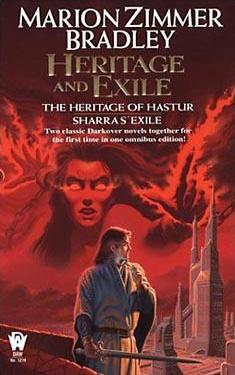 Marion Zimmer Bradley was the first author I chose after signing up for the Women of Genre Fiction challenge here at WWEnd. Anyone who’s been in the Science Fiction/Fantasy section of a bookstore has seen the huge trade paperback of The Mists of Avalon dominating the shelf. I’ve been noticing it for years and fully intended to take the opportunity provided by the WoGF challenge to finally read it.
Marion Zimmer Bradley was the first author I chose after signing up for the Women of Genre Fiction challenge here at WWEnd. Anyone who’s been in the Science Fiction/Fantasy section of a bookstore has seen the huge trade paperback of The Mists of Avalon dominating the shelf. I’ve been noticing it for years and fully intended to take the opportunity provided by the WoGF challenge to finally read it.
And yet….
When I looked at Bradley’s books in the WWEnd database, I noticed a series of books called “Darkover.” These books spanned her whole career of published works! I was intrigued and chose The Heritage of Hastur as my introduction to Darkover and Marion Zimmer Bradley.
What an introduction! This novel was a joy to read. Any trepidation I had about jumping into a long running series midway was soon laid to rest. The Darkover books are meant to be enjoyed as stand-alone novels as well as part of a series. Bradley does a great job of weaving the history and culture of Darkover into the narrative. At no point was I on the receiving end of an information dump or an “Our story so far…” synopsis.
WoGF Review: Mr. Fox by Helen Oyeyemi
 Shannon Fay (Sai) is an assistant bookstore manager and freelance writer. Since she doesn’t get enough of books at work she’s become a book club addict, joining practically every one that comes her way. Her dream is to get all the book clubs she’s involved with reading the same book so as to save herself some time and stress. Visit her website at www.ayearonsaturn.com.
Shannon Fay (Sai) is an assistant bookstore manager and freelance writer. Since she doesn’t get enough of books at work she’s become a book club addict, joining practically every one that comes her way. Her dream is to get all the book clubs she’s involved with reading the same book so as to save herself some time and stress. Visit her website at www.ayearonsaturn.com.
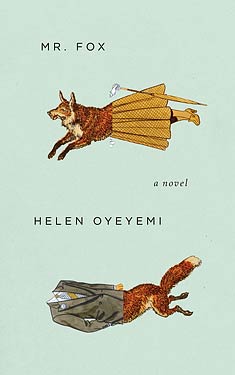 I would not classify Mr. Fox as fantasy. In fact, I would say it’s unclassifiable. I suppose that if you wanted to grab it, pin it down and examine it under glass and label it you could call it ‘slip-stream fiction,’ but why would you want to do that? Butterflies are so much prettier in the air then they are framed on a wall.
I would not classify Mr. Fox as fantasy. In fact, I would say it’s unclassifiable. I suppose that if you wanted to grab it, pin it down and examine it under glass and label it you could call it ‘slip-stream fiction,’ but why would you want to do that? Butterflies are so much prettier in the air then they are framed on a wall.
The book centers on a love triangle between Mr. Fox, his wife Daphne, and the mysterious Mary Foxe, Fox’s muse who may or may not just be a fiction of his imagination. As the book goes along, Mary seems to become more and more real, but really it’s just a trick that the author it playing on the reader. Mary is as ‘real’ as St. John Fox and Daphne Fox- no matter what might be going on in the narrative they are all characters in the same book and therefore all on the same standing.
Even though I said I didn’t have any desire to put a label on Mr. Fox I can’t help but get my two-cents in: The book is an interesting piece of meta-fiction. The book moves in and out of various narratives, sliding from the main story into Fox’s short stories and back, all while re-casting the various characters in different roles. It can be a hard book to hold on to, and it is not recommended reading when you have the flu or just before you go to sleep, lest you get confused between what you read and what you dreamed. The book (I hesitate to say ‘the plot’ as that doesn’t seem applicable here) doesn’t move forward but instead shuffles back and to the side, twisting and turning like a foxtrot. The various threads make you question what is real, but the point isn’t figuring out what ‘really’ happened so much as realizing that all the narratives are all equal. They are all stories, all lies, and all true.
 Mr. Fox has a lot to say about the relationship between men and women and the violence they visit on each other, both in the real world and in fiction. I thought the examples Oyeyemi wove into her work were interesting but I also didn’t feel like she reached a satisfying conclusion. Early on Mary seems determined to dissuade Fox from writing his vaguely misogynistic potboilers, but at the end of the book he’s still cheerily working away on his ‘serial killer accountant’ novel. But he does seem to be treating the women in his life better, which perhaps was Mary’s true goal all along.
Mr. Fox has a lot to say about the relationship between men and women and the violence they visit on each other, both in the real world and in fiction. I thought the examples Oyeyemi wove into her work were interesting but I also didn’t feel like she reached a satisfying conclusion. Early on Mary seems determined to dissuade Fox from writing his vaguely misogynistic potboilers, but at the end of the book he’s still cheerily working away on his ‘serial killer accountant’ novel. But he does seem to be treating the women in his life better, which perhaps was Mary’s true goal all along.
Mr. Fox is an enjoyable mind trip. Its fluid structure takes a bit of patience and can cause a bit of frustration, but it’s the good kind of frustration.
Book Gift Suggestions: Fantasy
We’ve all had those friends and family members who just don’t “get” genre fiction–who think that Fantasy is all about Hogwarts or football, who think that Science Fiction is no more than J.J. Abram’s oeuvre, who think that Horror is just a zombie in a hockey mask slicing up co-eds. You can either continue to inwardly seethe at these ignoramuses, or man up and buy them some fiction that will blow their minds and make them addicts just like you. To that end, we at Worlds Without End have put our heads together to come up with a list of books for the genre-clueless people in your life.
Today’s list contains half a dozen Fantasy books or franchises to knock the socks off the people who don’t have good genre taste… yet.
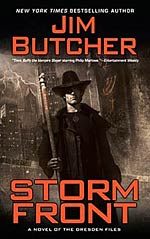 The Dresden Files, by Jim Butcher
The Dresden Files, by Jim Butcher
Butcher’s series about the self-deprecating wizard-for-hire Harry Dresden serves as a great introduction to the Urban Fantasy subgenre. Nearly every fantasy trope ends up on Harry’s to-do list at some point: vampires, warlocks, werewolves, faeries, ghosts, demons, archangels, and even the Shroud of Turin. The stories are frequently funny and always fast-paced, which makes the failure of its small-screen adaptation all the more perplexing.
Perfect For: Readers of thrillers and mystery novels.
First books in this series:
- Storm Front – Amazon.com, Amazon.co.uk, Kindle, Audible
- Fool Moon – Amazon.com, Amazon.co.uk, Kindle, Audible
- Grave Peril – Amazon.com, Amazon.co.uk, Kindle, Audible
- Summer Knight – Amazon.com, Amazon.co.uk, Kindle, Audible
- Death Masks – Amazon.com, Amazon.co.uk, Kindle, Audible
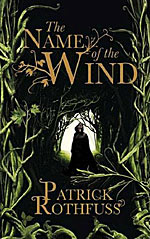 The Kingkiller Chronicles, by Patrick Rothfuss
The Kingkiller Chronicles, by Patrick Rothfuss
Some have described this series as Harry Potter for grownups. That’s a trite way of interpreting Rothfuss’ story about a polymath ne’er do well trying to survive through a school that focuses on alchemy and magical theory. It’s a lot smarter than the premise makes it sound. Rothfuss is well-educated himself, and he claims to have spent the better part of a decade writing and rewriting the first novel. This actually turns out to be a good thing.
Perfect For: The over-educated smartasses in your life.
First books in this series:
- The Name of the Wind – Amazon.com, Amazon.co.uk, Kindle, Audible
- The Wise Man’s Fear – Amazon.com, Amazon.co.uk, Kindle, Audible
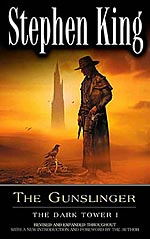 The Dark Tower, by Stephen King
The Dark Tower, by Stephen King
As far as I know, this series is King’s longest foray into Fantasy. Despite being only seven novels long (with an eighth “midquel” just published), it took King twenty-two years to complete the whole thing, publishing the last three in a great burst from 2003-4. Alternatively a magical realist action-adventure story and a running metafictional commentary, King considers this to be his magnum opus, and it has been a hit with his fans.
Perfect For: Lovers of complex and referential storytelling.
First books in this series:
- The Gunslinger – Amazon.com, Amazon.co.uk, Kindle, Audible
- The Drawing of the Three – Amazon.com, Amazon.co.uk, Kindle, Audible
- The Waste Lands – Amazon.com, Amazon.co.uk, Kindle, Audible
- Wizard and Glass – Amazon.com, Amazon.co.uk, Kindle, Audible
- Wolves of the Calla – Amazon.com, Amazon.co.uk, Kindle, Audible
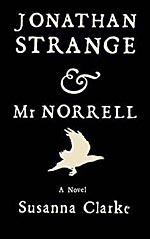 Jonathan Strange & Mr. Norrell, by Susanna Clarke
Jonathan Strange & Mr. Norrell, by Susanna Clarke
This 800-page doorstopper is an alternative history of England during the time of the Napoleonic Wars if magic had been a real historical phenomenon. The novel is written as a faux-history text, and I have to admit that Clarke even had me fooled into thinking that many of the references to pagan and medieval magic traditions were taken from the real world. It’s a love story mingled with the methodical restoration of magical practice, and all of its societal implications.
Perfect For: Admirers of alternate history, world-building, and the Romantic literary movement.
- Purchase – Amazon.com, Amazon.co.uk, Kindle, Audible
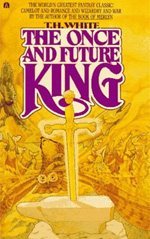 The Once and Future King, by T.H. White
The Once and Future King, by T.H. White
The four-book series (and a fifth posthumous volume) on the life and adventures of King Arthur’s royal court was a big hit when the first volume was published way back in 1938. This is not a thorough retelling of the Arthurian body of legends, but rather a selection of episodes (mostly well-known from Malory) that allow White to focus on the themes of war and morality that, being and Englishman writing during World War II, were heavy on his mind. The whimsical idea that Merlin is a backwards traveler through time has its origins here, and the Disney film The Sword in the Stone is a loose adaptation of White’s first volume of the same name.
Perfect For: Anyone who likes the show Merlin but wishes it were a bit smarter.
- Purchase – Amazon.com, Amazon.co.uk, Kindle, Audible
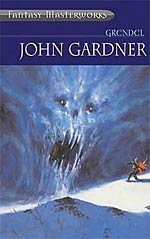 Grendel, by John Gardner
Grendel, by John Gardner
Gardner as a novelist has nearly disappeared from the American literary scene, despite once having multiple novels on the bestseller lists. Even though he’s now appreciated almost entirely for his books about writing, Grendel has remained a perennial favorite. Telling the story of Beowulf from the monster’s point of view gives Gardner the opportunity to dramatically explore (as he claims) the darker aspects of Jean-Paul Sartre’s existential philosophy. The novel also incorporates many of the postmodern conceits popular at the time, and despite its serious subject is laced with humor and irony.
Perfect For: Someone who read Wicked but thought the witch was the villain.
- Purchase – Amazon.com, Amazon.co.uk, Kindle, Audible
2012 British Fantasy Awards
The 2012 British Fantasy Awards were presented yesterday, September 30th, at FantasyCon in Brighton, England. This year the award has been split into two awards in the best Novel category: The Robert Holdstock Award for best fantasy novel and The August Derleth Award for best horror novel.
The Robert Holdstock Award: Among Others by Jo Walton (Tor, 2011)
The August Derleth Award: The Ritual by Adam Nevill (Pan Macmillan, 2011)
See the complete list of winners in all categories on the BFS site. Congratulations to all the winners and nominees. Among Others has now won 3 out of the 5 awards it’s been nominated for including the Hugo and Nebula awards.
Review: Among Others by Jo Walton
Daniel Roy (triseult), has contributed over 30 reviews to WWEnd including 2 for the GMRC. Daniel is living his dream of travelling the world and you can read about some of his adventures on his blog Mango Blue.
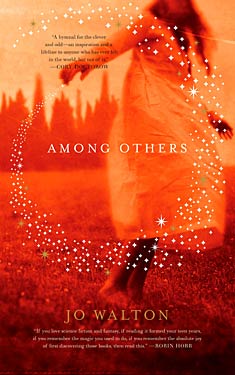 I love this book so much. It’s clever and inventive and filled with the kind of literary truth that leaves you breathless. Among Others received the Nebula Award, and even beat Miéville’s Embassytown to the Hugo. And you know what? Jo Walton totally deserved it.
I love this book so much. It’s clever and inventive and filled with the kind of literary truth that leaves you breathless. Among Others received the Nebula Award, and even beat Miéville’s Embassytown to the Hugo. And you know what? Jo Walton totally deserved it.
Among Others is something new in a genre already known for invention: it’s what I like to call “speculative autofiction.” It features the strengths of both SF and autofiction, and each genre adds to the other to transcend either into something refreshing and exciting. Among Others is the story of Welsh-born Morwenna, who ends up in a boarding school in England following mysterious tragic events involving her mother and twin sister. The story is told in the form of Morwenna’s diary, as she chronicles her life in this strange new environment. But Morwenna happens to see faeries, and knows how to use magic spells.
The ambiguity surrounding Morwenna’s magic is a piece of intricate, subtle, and clever world-building. It’s not the kind of magic that allows you to throw fireballs; as a matter of fact, it’s so subtle that if you stop believing in it, it might suddenly seem like a series of fortunate coincidences. Likewise, it’s not clear whether the faeries are real, or if they’re the product of a hyperactive child’s imagination. Yet as a fantasy system, the faeries and their magic work perfectly. They’re clever and inventive, and they work on many levels. Ultimately, the title of the novel itself is a piece of similar ambiguity: it’s not clear if the “others” in the title refers to faeries, or to the mundane world in which Morwenna struggles to survive.
The Crooked Letter
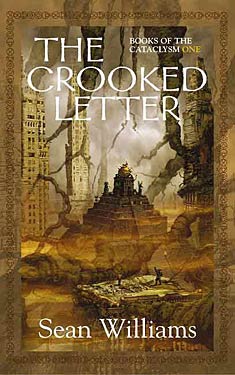 The first novel in a rather extensive fantasy series, Sean Williams’ The Crooked Letter is half kabbalistic text, half apocalyptic literature, and all around general mind twist. The plot is deceptively simple: one of a pair of twins is murdered while vacationing in Europe, which triggers the apocalypse, and both twins have to do what they can from their respective sides of death to prevent it from destroying all the worlds. In an interview about this novel, Williams jokes that if his attempt to build a fantasy world out of all his research into gnostic and world religions doesn’t pan out, he can always use it to found a new religion. He’s not far off the mark, though I doubt any of the older, self-respecting gnostic cults would have appreciated Williams publishing all of their secrets for the public.
The first novel in a rather extensive fantasy series, Sean Williams’ The Crooked Letter is half kabbalistic text, half apocalyptic literature, and all around general mind twist. The plot is deceptively simple: one of a pair of twins is murdered while vacationing in Europe, which triggers the apocalypse, and both twins have to do what they can from their respective sides of death to prevent it from destroying all the worlds. In an interview about this novel, Williams jokes that if his attempt to build a fantasy world out of all his research into gnostic and world religions doesn’t pan out, he can always use it to found a new religion. He’s not far off the mark, though I doubt any of the older, self-respecting gnostic cults would have appreciated Williams publishing all of their secrets for the public.
The plot takes a hundred detours through this terrifically complex set of worlds. If the worlds that comprise the afterlife aren’t complicated enough, even our physical world is re-envisioned as a scary realm of barely hidden monsters and deities. There’s a reason Williams calls this book “my Silmarillion” — it’s a guided tour through the worlds of magic and anti-magic, rather than being driven by a dramatic character arc. That’s not necessarily a waste of time, and his world-creation is fascinating enough to hold one’s attention for a while, but after the 300th page one starts yearning for some more common narrative arcs.
I will say that Williams has a talent for good character moments, even if they tend to get buried in the rubble of the end of the world. The love triangle between the twins and a fellow Australian traveler is heart-rending at times, made the more so when she is used as a pawn against them. There is also a prevailing sense of sadness amongst many inhabitants of the afterlife, who worry that their home world will also be destroyed in the wreckage of our world. Even a minor time travel conceit (which I generally hate) works well for the development of some characters.
It’s hard to say how many readers will like this novel. For some, like me, it might be a curiosity that they pick up once a week, spurred on by the gradually unfolding apocalypse. Others might find it entertaining to match up Williams’ characters to figures in ancient mythology (the appendix is helpful for this kind of reader). The descriptions of The Crooked Letter‘s sequels leads me to think that they follow a more popular style of story structure. He admits that this is probably his least successful book, but I can believe that Williams is a perfectly competent writer, and that his subject matter simply got the better of him in this novel. Worth your time if you don’t mind taking your time.
Forays into Fantasy: The Mabinogion Tetralogy by Evangeline Walton
Scott Lazerus is a Professor of Economics at Western State Colorado University in Gunnison, Colorado, and has been a science fiction fan since the 1970s. The Forays into Fantasy series is an exploration of the various threads of fantastic literature that have led to the wide variety of fantasy found today, from the perspective of an SF fan newly exploring the fantasy landscape. FiF will examine some of the most interesting landmark books of the past, along with a few of today’s most acclaimed fantasies, building up an understanding of the connections between fantasy’s origins, its touchstones, and its many strands of influence.
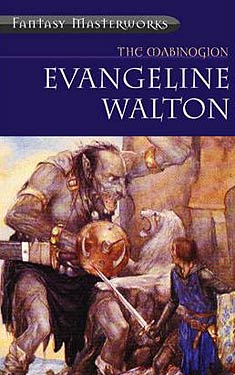 The paperback republication of The Lord of the Rings in the 1960s and its subsequent wild success created a whole new audience for fantasy, and led to a fantasy publishing boom in the 1970s. Along with spawning, for better or worse, an unending stream of new epic fantasy, the belated popularity of J. R. R. Tolkien also sent publishers looking for other older fantasy novels to reprint. One result was Ballantine’s Adult Fantasy series, which reprinted sixty-five novels between 1969 and 1974, under the editorship of Lin Carter. Books by Lord Dunsany, Clark Ashton Smith, H. P. Lovecraft, William Hope Hodgson, James Branch Cabell, and many others now considered fantasy classics were brought back into print and released as affordable paperbacks for fantasy-hungry readers. One of Carter’s more obscure finds was the eighteenth book in the series, The Island of the Mighty by Evangeline Walton, a novelistic retelling of the fourth “branch” of the Mabinogion—a series of Welsh-language legends of the British Isles dating from the fourteenth century, the stories themselves most likely originating in the twelfth. Though it had received some critical acclaim on release in 1936 under its original unfortunate (though not inaccurate) title The Virgin and the Swine, it had failed to sell and was pretty well forgotten by the time Carter brought it to Ballantine’s attention.
The paperback republication of The Lord of the Rings in the 1960s and its subsequent wild success created a whole new audience for fantasy, and led to a fantasy publishing boom in the 1970s. Along with spawning, for better or worse, an unending stream of new epic fantasy, the belated popularity of J. R. R. Tolkien also sent publishers looking for other older fantasy novels to reprint. One result was Ballantine’s Adult Fantasy series, which reprinted sixty-five novels between 1969 and 1974, under the editorship of Lin Carter. Books by Lord Dunsany, Clark Ashton Smith, H. P. Lovecraft, William Hope Hodgson, James Branch Cabell, and many others now considered fantasy classics were brought back into print and released as affordable paperbacks for fantasy-hungry readers. One of Carter’s more obscure finds was the eighteenth book in the series, The Island of the Mighty by Evangeline Walton, a novelistic retelling of the fourth “branch” of the Mabinogion—a series of Welsh-language legends of the British Isles dating from the fourteenth century, the stories themselves most likely originating in the twelfth. Though it had received some critical acclaim on release in 1936 under its original unfortunate (though not inaccurate) title The Virgin and the Swine, it had failed to sell and was pretty well forgotten by the time Carter brought it to Ballantine’s attention.
As explained in publisher Betty Ballantine’s introduction to Overlook’s 2002 omnibus edition of The Mabinogion Tetralogy (also published under the Fantasy Masterworks banner, of which The Island of the Mighty is the fourth and final book, Ballantine’s desire to publish the novel set in motion a heartwarming series of events. Having initially been informed that the book’s copyright had expired, and having searched fruitlessly for Walton, Ballantine prepared the work for publication, finding out at the last minute that the copyright had in fact been renewed, and that Walton was alive and well and living in Phoenix. Walton’s childhood had been marked by illness that kept her in her home, and medical treatments that resulted in a skin condition that would make her reluctant to appear in public later in life. Seeking refuge in books, she developed a love of fantasy and medieval literature, leading to a determination to retell The Mabinogion as a series of fantasy novels.
GMRC Review: Hrolf Kraki’s Saga by Poul Anderson
 Rhonda Knight is a frequent contributor to WWEnd through her many reviews and her excellent blog series Automata 101 and Outside the Norm. This is Rhonda’s seventh featured review for the Grand Master Reading Challenge. She won the GMRC Review of the Month for March for her review of The Word for World is Forest by Ursula K. Le Guin.
Rhonda Knight is a frequent contributor to WWEnd through her many reviews and her excellent blog series Automata 101 and Outside the Norm. This is Rhonda’s seventh featured review for the Grand Master Reading Challenge. She won the GMRC Review of the Month for March for her review of The Word for World is Forest by Ursula K. Le Guin.
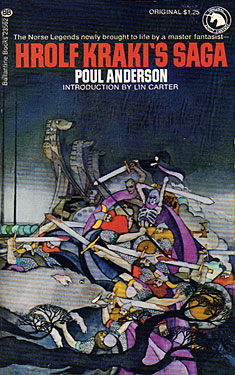 Poul Anderson‘s Hrolf Kraki’s Saga is a retelling of the Icelandic saga by the same name. Scholars believe the Icelandic saga was composed between the mid-eleventh and the mid-thirteenth centuries. Most of the Icelandic sagas written during this time record the history of the settlement of Iceland (beginning in the late 800s) or the rise of the first families of Iceland. Famous examples of such are Erik the Red’s Saga and Njal’s Saga. Hrolf’s is different from these family sagas, as they are usually called. It is a legendary saga, set in a long ago and far away Denmark. Scholars date the events occurring in Hrolf’s Saga to the late fifth and early sixth centuries. Interestingly, Hrolf’s ancestors, who figure prominently in the saga, are probably the same historical figures who appear in the Anglo-Saxon epic Beowulf. The Scylding clan found in Beowulf is called the Sköldings in Hrolf’s: the Hrolf figure is Hrothulf in Beowulf; his grandfather is Halfdan/Healfdane; his father is Helgi/Halga; and his uncle is Hroar/Hrothgar.
Poul Anderson‘s Hrolf Kraki’s Saga is a retelling of the Icelandic saga by the same name. Scholars believe the Icelandic saga was composed between the mid-eleventh and the mid-thirteenth centuries. Most of the Icelandic sagas written during this time record the history of the settlement of Iceland (beginning in the late 800s) or the rise of the first families of Iceland. Famous examples of such are Erik the Red’s Saga and Njal’s Saga. Hrolf’s is different from these family sagas, as they are usually called. It is a legendary saga, set in a long ago and far away Denmark. Scholars date the events occurring in Hrolf’s Saga to the late fifth and early sixth centuries. Interestingly, Hrolf’s ancestors, who figure prominently in the saga, are probably the same historical figures who appear in the Anglo-Saxon epic Beowulf. The Scylding clan found in Beowulf is called the Sköldings in Hrolf’s: the Hrolf figure is Hrothulf in Beowulf; his grandfather is Halfdan/Healfdane; his father is Helgi/Halga; and his uncle is Hroar/Hrothgar.
Anderson was, of course, aware of Hrolf’s origins and connections. With these in mind, he created a tale that stays very close to its origins, yet expands to encompass the saga’s connections to other legends and stories. Anderson incorporates bits from other sources, such as Saxo Grammaticus’s Gesta Danorum and Snorri Sturlusson’s Poetic Edda to fill in the saga’s gaps In constructing his tale, Anderson thinks about the multiple paths that this legend might have taken as an oral tale. Clearly, one of those paths led from Denmark through many countries and centuries until it reached medieval Iceland where it was written down, but there are multiple paths of transmission for any oral tale. In his intro, he writes:



















 Full Details
Full Details
